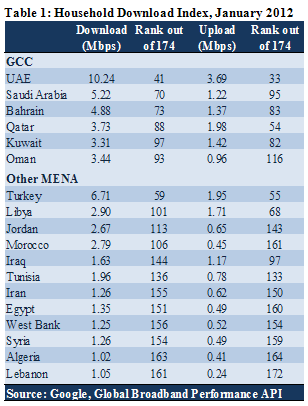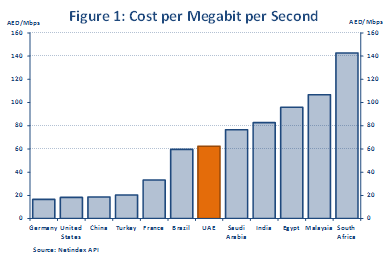Fast and low-cost internet services, growing population and income dynamics behind the success of the sector in the Emirate, Dubai Chamber study finds out
Dubai, UAE: A recent Dubai Chamber of Commerce and Industry study reveals that cloud computing, which is the provision of a range of services including shared resources, software, and information, is proving attractive for developers and businesses due to the unprecedented growth and high profitability prospects offered by the sector in the coming years.
The study, released on the sidelines of the opening of the 2nd Cloud Computing World Forum Middle East and North Africa in Dubai being attended by over 200 leading regional and international companies, states that the organising of the event for the second consecutive year is testament to the growing demand for the cloud computing services.
The forum brings together business in Dubai and the region to discuss the latest topics in cloud, such as cloud security, mobile, applications, communications, virtualisation and customer relationship management (CRM) platforms. The sector continues to lure developers and service firms to Dubai, informs the study.
Also, with the unprecedented growth experienced by the internet and communications technology sector in the UAE and the wider MENA region consumers and businesses have become progressively sophisticated in their use of the internet and file management. The trend has also led to the availability of an array of service-based opportunities arising from cloud computing.
Drivers of growth
The cloud computing industry, broadly understood as the integration of applications, platforms and infrastructure services, is proving attractive to the investor for several reasons. Perhaps the most important factor is that cloud services buck the trend of the economic cycle. Internet-based technologies are often considered a daily necessity and therefore exhibit solid growth in relation to the economy.
In the UAE, and the wider GCC, growth prospects for the sector are amplified partly because of the technology-savvy population dynamic of an emerging yet sizeable growing middle income class. According to Economist Intelligence Unit forecasts, the GCC population will reach 53 million by 2020. As incomes rise, spending on technology typically rises as consumers tend to become more service-focused.
Other regional drivers for growth are access-related. The UAE is proving to be an optimal location to launch products because of its relatively fast internet connection speeds and reliable networks. Table 1 illustrates sampled UAE household internet download and upload speeds in relation to selected countries in the MENA region.

The UAE is the region's fastest in terms of download 10.2 Mbps (megabits per second) and upload 3.7 Mbps. The closest GCC partner, Saudi Arabia offers speeds of 5.2 Mbps download and 1.2 Mbps upload. Other MENA countries such as Libya offer up to 2.9 Mbps download and 1.7 Mbps upload.
The study further reveals that cloud services will become more entrenched in daily lives as the internet speeds and penetration rates in the MENA expand. Growth in cloud services is also compounded by the fact that profitability for cloud-based services remains high because they are, in comparison to other sectors, relatively easy to increase in scale with very little additional distribution or marketing costs - as is the case with most internet-bound services.
These factors are proving to be lucrative for companies that are establishing operations in Dubai. Moreover, Dubai is being treated as a sales hub from which to launch products to the wider GCC and MENA region.
Future prospects
There are several attractive features that are luring multinationals to focus their activities on the UAE's potential for the cloud. The UAE has a relatively low internet costs. A megabit per second in the UAE costs AED 62 compared with AED 76 in Saudi Arabia, the nearest regional counterpart (see Fig. 1). This is lower than AED 82 and AED 96 in India and Egypt, respectively. The internet costs are, however, higher than several markets in Europe and Asia. This is primarily because these markets have large populations that lead to lower infrastructure provision costs on a per capita basis as well as lower Mbps costs.

Industry experts cite that there is potential for further growth in the cloud services in the light of the challenging economic environment. The cloud offers enormous potential in terms of reduced costs, operational flexibility and enhanced productivity.
Challenges
The study highlights several challenges confronting the sector in the UAE stating that the local IT sector is relatively small and focused on bringing in talent from overseas. The market is reliant on cutting edge developments, of which India is the biggest supplier from Asia, followed by regional leaders such as Jordan and Egypt.
This is also compounded by the fact that the pace of regional innovation risks falling prey to other innovator rival hubs such as Singapore, and although domestic privacy laws are improving, they are still migrating towards international standards. These challenges are likely to be addressed by both the disparate regulations between the emirates and the national institutions over the medium to long-term, thereby encouraging more foreign direct investment.
Conclusion
In its conclusion, the study reveals that despite prevailing challenges, the market for cloud services is likely to remain strong in the wake of strong growth changes region-wide. The prospects for the sector are likely to improve over time as local and national legislation continues to be in closer agreement with international standards while the growing population and incomes dynamic underpin the growth for the foreseeable future, it states.
Established in 1965, the Dubai Chamber of Commerce and Industry is a non-profit public entity, whose mission is to represent, support and protect the interests of the business community in Dubai by creating a favourable business environment, supporting the development of business, and by promoting Dubai as an international business hub.
© Press Release 2012



















